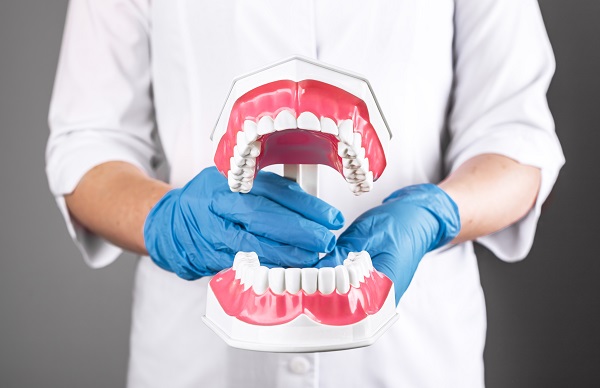TMJ Treatments From A General Dentist

TMJ disorders are known to be one of the most grueling, as they induce a lot of discomfort and difficulty eating. However, modern-day technology has allowed for a wide range of options when it comes to treatment plans. Working with a general dentist is typically the first step. As surprising as it may be, general dentists are actually the first point of contact for diagnosing and treating TMJ disorders.
Treatment for TMJ disorders
Outlined below are a few ways that general dentists treat TMJ disorders. Of course, the treatment plan will vary from patient to patient; however, the following information offers general guidelines to TMJ sufferers.
Mild cases of TMJ disorders
General dentists will typically treat mild cases of TMJ disorder via a few different avenues, based on the patient's symptoms. Mild cases tend to induce symptoms such as difficulty eating or speaking, jaw clicking and slight discomfort. Outlined below are a few treatment options that a general dentist may suggest and/or prescribe.
- Hot and cold therapy
- Low doses of muscle relaxers
- Oral splints
- Jaw exercises
- Over-the-counter anti-inflammatory medications
In most scenarios, the dentist may recommend one of the treatment options above; however, a lot of the time, it is trial and error. Multiple treatments may need to be done together in order to get the most effective results. For example, some patients may require a muscle relaxer and oral splint at the same time.
Moderate cases of TMJ disorders
TMJ disorders that cause more moderate symptoms may require an in-depth treatment plan. Moderate cases present themselves via chronic pain, jaw locking, teeth grinding and headaches. The following treatment options would be considered in conjunction with or following the ones listed under the mild category.
- Higher doses of muscle relaxers
- Oral physical therapy
- Custom-made night guards to prevent teeth grinding
- Pain medications
- Acupuncture
A lot of TMJ disorder sufferers experience moderate to severe symptoms, which can be detrimental to oral health and overall comfort. When symptoms become severe, serious treatment may have to be explored.
Severe cases of TMJ disorders
General dentists can provide a number of treatments to sufferers of TMJ disorders, with the most severe options being rarer. Outlined below are some of the most severe treatment options for TMJ disorders.
- Open-joint surgery
- Facial injections
- TMJ arthroscopy
- Modified condylotomy
Of course, general dentists will start with mild to moderate treatments; however, individuals who suffer from chronic TMJ disorder may require more in-depth procedures in order to eliminate the pain and dysfunction that comes with the disorder.
Find out more from a general dentist
Want further information on treating TMJ disorders? Talking with a general dentist is the best place to start. Any questions or concerns can be addressed, and an evaluation can be done in order to determine the most appropriate course of action. Reach out today to find out more about TMJ disorder treatment or to get scheduled for a consultation appointment with the dentist.
Request an appointment here: https://gladuradds.com or call Gladura Dental at (740) 780-0619 for an appointment in our Pataskala office.
Check out what others are saying about our dental services on Yelp: TMJ Dentist in Pataskala, OH.
Related Posts
TMJ can cause an immense amount of pain and discomfort, specifically in the jaw. However, when this joint condition becomes an ongoing problem, many individuals also suffer from headaches. TMJ headaches are not as easily treatable as a random migraine here and there. Instead, they often require a deeper dive because the root of the…
If you have recently been diagnosed with TMJ disorder, a dentist might recommend getting a bite guard to ease the symptoms. TMJ disorder causes symptoms such as earaches, headaches and facial pain. Since the symptoms worsen gradually and appear unrelated, the condition can go undiagnosed and untreated, and it affects a patient's quality of life.Several…
Many patients ask what makes a deep teeth cleaning different from a routine visit for a checkup. The short answer is that a routine visit every six months focuses on prevention, while a deep teeth cleaning targets active gum infection. Both appointments support oral health, yet they serve different needs. Learning more about the differences…
The general dentist often uses a dental filling as a restoration procedure for teeth damaged due to decay. Unless the tooth is severely damaged and needs a root canal and a crown, only the tooth filling will be enough. It is better to visit the dentist regularly for checkups, so decay not get too severe.The…
